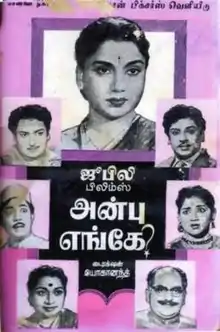Anbu Engey
Anbu Engey (தமிழ்': அன்பு எங்கே? English: Where is the love?) is a 1958 black-and-white Indian Tamil drama film, directed by D. Yoganand and produced by V. Govindarajan. Its story was written by Murasoli Maran and screenplay by Rajendra. The film stars S. S. Rajendran, K. Balaji, Pandari Bai and S. V. Ranga Rao in the lead roles, with Devika, T. R. Ramachandran, Manorama and Mynavathi in supporting roles.[1] The film was a runaway success.[2][3][4]
| Anbu Enge அன்பு எங்கே? | |
|---|---|
 Film Poster | |
| Directed by | Dasari Yoganand |
| Produced by | V. Govindarajan |
| Screenplay by | Rajendra |
| Story by | Murasoli Maran |
| Starring | S. S. Rajendran K. Balaji S. V. Ranga Rao Pandari Bai Mynavathi T. R. Ramachandran |
| Music by | Vedha |
| Cinematography | B. S. Selvaraj |
| Edited by | R. Rajan |
| Distributed by | Jubilee Films |
Release date | 22 January 1958 |
Running time | 142 Mins |
| Country | India |
| Language | Tamil |
Plot
The story revolves around a rich man (S. V. Ranga Rao) who has two sons (K. Balaji and S. S. Rajendran) and a daughter (Mynavathi). The father is a gambler and the elder son (Balaji) is a womaniser and alcoholic. He, however, ends up marrying a traditional woman (Pandari Bai), who takes it upon herself to reform the family. The family maid (Devika) takes care of the younger son (Rajendran) and the two get married, with the blessings of the family.[1]
Cast
- S. S. Rajendran as Somu, Masilamani's younger son
- K. Balaji as Ramu, Masilamani's elder son
- Pandari Bai as Amudha, Ramu's wife
- S. V. Ranga Rao as Masilamani Mudaliar, Somu, Ramu & Kamu's father
- Devika as Parvathi, Masilamani's housemaid
- T. R. Ramachandran as Appavu, Kamu's husband
- Mynavathi as Kamu, daughter of Masilamani
- Manorama in guest appearance
- V. S. Raghavan in guest appearance
- S. A. Ashokan in guest appearance
- Suriyakala as Mala
- Lakshmi Prabha as Alamelu, Masilamani's wife
- S. D. Subbulakshmi as Amudha's mother
Crew
- Director: D. Yoganand
- Producer: K. Govindarajan
- Script: Murasoli Maran
- Art: Cot Gahangar
- Stills: R. N. Nagaraja Rao
- Processing: Sardul Singh Sethy
- Audiography (Songs)" E. I. Jeeva, T. S. Rangasamy, and R. Rajagopal
- Audiography (Dialogue): M. Nageswaran
- Publicity: Baktha
- Choreography: Chinni - Sambath, Chopra and Jayaraman
Reception
S. S. Rajendran, who played the part of the younger son excelled after his successful film Muktha Srinivasan's Muthalali. Pandari Bai gave a dignified performance as the wife.[1][5]
Soundtrack
The music was composed by Vedha, with lyrics written by Pattukottai Kalyanasundaram, Kannadasan, Thanjai N. Ramaiah Dass,[6] Vindhan and V. Seetharaman.[7] Playback singers are T. M. Soundararajan, A. M. Rajah, K. Jamuna Rani, P. Leela, P. Suseela, R. Balasaraswathi Devi and Radha Jayalakshmi.[8]
The two songs Melay Parakkum Rockettu and Dingiri Dingale (the songs with Baila music, which in turn was influenced by Portuguese music) topped the charts. The songs were rendered. These songs are still remembered by film buffs.[1][9][10]
| No. | Song | Singers | Lyrics | Length(m:ss) |
|---|---|---|---|---|
| 1 | "Melae Parakkum Rockettu" | K. Jamuna Rani | Thanjai N. Ramaiah Dass | 03:28 |
| 2 | "Amirtha Yogam" | T. M. Soundararajan & P. Leela | 03:17 | |
| 4 | "Kadhal Endral Enna" | K. Jamuna Rani | 02:58 | |
| 7 | "Kaayaa Pazhamaa Sollu Raajaa" | Radha Jayalakshmi | 01:45 | |
| 8 | "Poovil Vandu" | A. M. Rajah & K. Jamuna Rani | 03:10 | |
| 3 | "Aana Aavanna" | K. Jamuna Rani | Pattukottai Kalyanasundaram | 03:16 |
| 5 | "Sollu Nee Raajaa" | R. Balasaraswathi Devi | Vindhan | 01:46 |
| 6 | "Ethanai Kodi Panam" | P. Suseela | Kannadasan | 03:45 |
| 9 | "Dingiri Dingaale" | T. M. Soundararajan | V. Seetharaman | 04:52 |
References
- Randor Guy (17 May 2014). "Blast from the Past — Anbuengey 1958". "The Hindu". Retrieved 26 February 2016.
- "Anbu Enge". spicyonion. Retrieved 17 March 2016.
- http://tamilrasigan.com/anbu-engey-1958-tamil-movies-online-watch-free/
- "anbu engey movie". gomolo. Retrieved 17 March 2016.
- http://article.wn.com/view/2014/05/17/Anbu_Engey_1958/
- "ramiahdas". indian heritage. Retrieved 17 March 2016.
- http://www.saregama.com/album/anbu-enge_13466
- G. Neelamegam. Thiraikalanjiyam — Part 1 (in Tamil). Manivasagar Publishers, Chennai 108 (Ph:044 25361039). First edition December 2014. p. 136.
- "Anbu Enge songs". tamiltunes. Archived from the original on 24 March 2016. Retrieved 17 March 2016.
- "tms". Indian Heritage. Retrieved 17 March 2016.